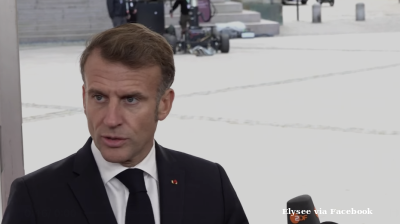Ukrainian President Volodymyr Zelenskiy has lashed out at the “don’t escalate” rhetoric as Bankova becomes increasingly more desperate that Western support might be evaporating.
"For almost two years, Western leaders have denied Ukraine the weapons needed to win the war for fear of provoking [Russian President Vladimir] Putin,” Zelenskiy said in one of his regular video addresses. “It should now be crystal clear that nothing is more likely to provoke further Russian aggression than continued Western weakness." There is no disguising the rising desperation in the tone of Bankova’s rhetoric as the war in Ukraine is pushed off the front page due to the expanding numbers of conflicts around the world. But Ukraine fatigue was already visible last summer, when funding by the West fell off dramatically in August. US funding came to halt completely in January after the White House representative of the National Security Council John Kirby said it had run out of money completely for Ukraine.
Western financial and military aid has become snarled in internal wrangling. A US $61bn aid package has got stuck in Congress and is increasingly unlikely to pass as US senators increasingly push Europe to seize the $300bn of frozen Central Bank of Russia (CBR) reserves as an alternative way of paying for the war – something that EU members are very reluctant to do.
President Joe Biden’s top aides bluntly told lawmakers in a private meeting on January 19 that if Congress fails to authorise additional military aid for Ukraine, Russia could win the war “in a matter of weeks – months at best,” according to two people familiar with the meeting, NBC reported.
National Security Advisor Jake Sullivan and the Director of National Intelligence Avril Haines told the lawmakers that Ukraine will run out of certain air defence and artillery capabilities in the coming weeks.
At the same time, an EU four-year €50bn support package is likewise tied up by countries such as Hungary and Slovakia that want to wind down the financial support for Ukraine.
Brussels is working hard to come up with dodges to keep the money flowing but continued US funding is looking increasingly less likely, or at least will very likely be reduced.
The lack of help is already showing up on the frontlines where reports say artillery shells are already being rationed and the firing ratio is now 10:1 in Russia’s favour.
“There is no disguising the disquiet in today’s Ukraine as the country braces itself for what promises to be an exceptionally difficult year. The optimism of early 2023 has been replaced by a far gloomier outlook that reflects the failure of Ukraine’s much-hyped counter-offensive and mounting alarm over delays in vital military aid from the country’s international partners,” Peter Dickinson, editor of the Atlantic Council’s UkraineAlert service, said in a recent op-ed.
These problems have engendered a change in Bankova’s rhetoric that is now increasingly linking Ukraine’s fate to that of the rest of Europe. Zelenskiy and Ukraine’s Foreign Minister Dmytro Kuleba are warning “Nato is next” in a troupe that has been picked up by Ukraine’s international supporters.
But it is failing to gain much traction, as the chances of Russia attacking a Nato country, or invading the Baltics or Poland, for example, are next to zero, Mark Galeotti argued in a recent column for bne IntelliNews.
It appears that Nato members simply don’t believe Russia is about to attack them, despite the public scaremongering. Most of the members are still not spending the recommended 2% of GDP on defence, and as bne IntelliNews has reported, Europe has invested little in ramping up its production of traditional weapons like artillery shells that would be needed in a war with Russia. Indeed, according to several reports and studies, countries like Germany and the UK would run out of ammo within weeks of a war with Russia. IF European governments really fear war with Russia is imminent they are doing absolutely nothing to prepare for it.
Nevertheless, Zelenskiy is right, as avoiding war with Russia has been Nato’s number one priority since the very first week of the war, as Nato Secretary General Jens Stoltenberg told a press conference at the time.
Nato is caught on the horns of a dilemma: it doesn’t want to see Ukraine conquered by Russia, but at the same time doesn’t want to do anything that could provoke a direct conflict with Russia.
European Commission President Ursula von der Leyen and Stoltenberg have said on many occasions that Ukraine “belongs in the Nato family” or is “on the path to Nato”, but when pushed by Zelenskiy for a concrete road map to membership, for example, at last July’s Nato summit in Vilnius, he has been met with a stony silence.
The upshot is that Ukraine has been given the resources so that it won’t lose the war, but not enough to win it. Underpinning this strategy – that will maximise the death toll – is the fear that if Ukraine were actually to be close to defeating Russia, then Putin would massively escalate.
So far the Kremlin has avoided doing more than a partial mobilisation and currently relies on volunteers to boost the army’s manpower. He has also avoided carpet bombing Kyiv and most of the other big cities in the West, but with almost total control of the skies this remains an option. And if Russia was close to defeat, the use of tactical nuclear weapons cannot be ruled out. That is a scenario that Nato members want to avoid at all costs.
The failure of the much-vaunted counteroffensive this summer has left the war in a stalemate and as the West is unwilling to up the power of offensive weapons it sends to Ukraine again – F-16 are not due to arrive until 2025 and Germany is refusing to send its powerful Taurus missiles – the muted calls for a ceasefire to freeze the conflict are growing steadily louder.


